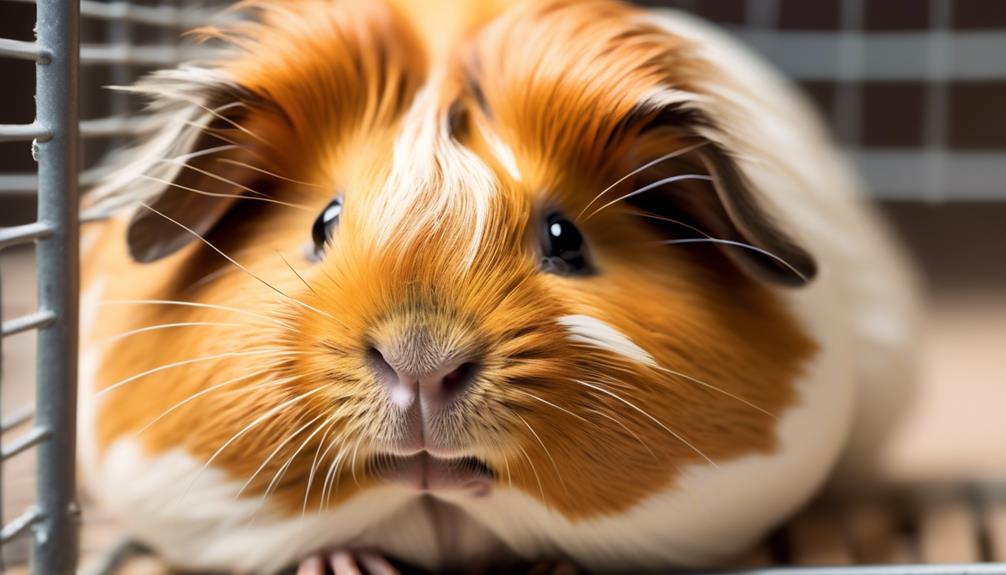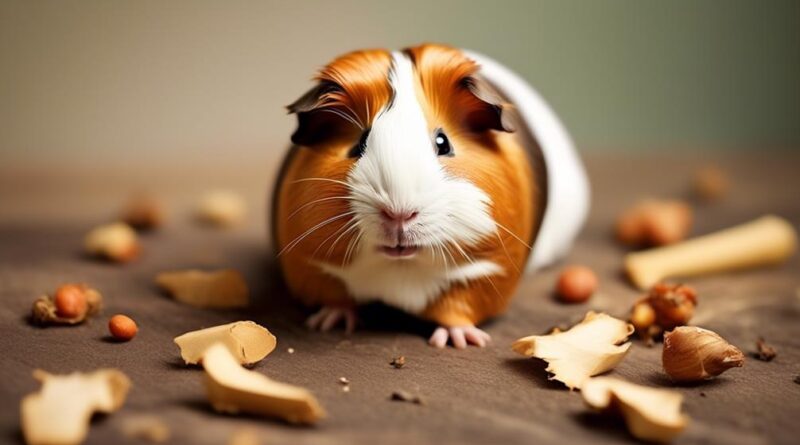Interpreting Your Adopted Guinea Pig's Actions
Did you know that guinea pigs have a wide range of vocalizations, with some experts estimating they can produce up to 11 different sounds?
Understanding what your adopted guinea pig is trying to communicate can be a fascinating and rewarding experience.
From their body language to their eating habits, guinea pigs have unique ways of expressing themselves that can clue you in to their mood and needs.
As you observe and interact with your furry friend, you'll begin to pick up on these cues and develop a deeper connection with your pet.
Body Language
Understanding your guinea pig's body language is crucial for interpreting their emotions and needs accurately. Communication cues and behavioral signals are the key to deciphering what your furry friend is trying to convey.
One of the most common communication cues is when your guinea pig purrs or vibrates. This gentle, rumbling sound indicates contentment and happiness, often accompanied by a relaxed body posture.
On the other hand, if your guinea pig is making high-pitched, continuous noises, it could be a sign of distress or discomfort. Pay attention to their body language; a guinea pig that feels threatened may arch its back, raise its rump, and show its teeth. This is a clear sign to give them some space and approach with caution.
Understanding these behavioral signals can help you create a safe and comfortable environment for your guinea pig, allowing you to bond with them more effectively.
Another important cue is their eating habits; if your guinea pig suddenly stops eating or drinking, it could be a sign of illness and requires immediate attention.
Vocalizations
When your guinea pig makes vocalizations, such as high-pitched, continuous noises, it could be a sign of distress or discomfort, requiring your attention and understanding. Understanding your guinea pig's vocalizations is crucial for building a strong bond and ensuring their well-being.
Here are some communication cues to help you interpret your guinea pig's sounds:
- Pitch and Tone: Pay attention to the pitch and tone of your guinea pig's vocalizations. High-pitched squeals may indicate fear or pain, while lower, rumbling sounds could signify contentment or communication with other guinea pigs.
- Context: Consider the context in which the vocalizations occur. For example, if your guinea pig is making soft, purring noises while being petted, it's likely a sign of happiness. On the other hand, loud, repeated squeaks during grooming sessions may indicate discomfort.
- Frequency: Take note of the frequency of the vocalizations. Continuous, high-pitched squealing may signal a distressed or anxious guinea pig, while intermittent, low cooing sounds could indicate relaxation.
Understanding sounds is essential for gauging your guinea pig's emotions and needs. By paying attention to their vocalizations and observing their body language, you can develop a deeper understanding of your guinea pig's behavior and strengthen your bond with them.
Eating Habits
Guinea pigs have specific eating habits that are important to understand in order to ensure their health and well-being. Understanding your guinea pig's dietary preferences is crucial for their overall well-being.
They're herbivores and require a diet high in hay, supplemented with fresh vegetables and a moderate amount of pellets. It's important to monitor their weight and adjust their diet accordingly to ensure they maintain a healthy weight. Obesity can lead to various health issues, so it's essential to provide a balanced diet and monitor portion sizes.
Additionally, being mindful of digestive issues is crucial. Guinea pigs are prone to digestive problems, such as bloating and gastrointestinal stasis. Ensuring they have access to a constant supply of hay is essential for their digestive health. Monitoring their mealtime behavior can provide insights into their well-being. A sudden change in appetite or a reluctance to eat may signal an underlying health issue and should be addressed promptly.
Observing your guinea pig's mealtime behavior can also offer cues about their preferences and overall health. Some guinea pigs may be pickier eaters than others, and understanding their mealtime behavior can help ensure they're getting the nutrients they need. By observing their eating habits, you can tailor their diet to accommodate their preferences while ensuring they receive the necessary nutrients for optimal health.
Social Interactions
To promote positive social interactions among guinea pigs, provide them with ample space to move around and interact with each other freely. Guinea pigs are social animals that thrive in groups. Understanding their social behaviors is essential for ensuring their well-being and happiness. Here are some key points to consider:
- Grooming Behavior: Guinea pigs engage in grooming behavior as a way of bonding and establishing social bonds within their group. This behavior involves one guinea pig gently nibbling or licking another guinea pig's fur. It not only helps in maintaining cleanliness but also fosters social connections and a sense of security among the group members.
- Dominance Hierarchy: Within a group of guinea pigs, there's often a clear dominance hierarchy. This hierarchy is established through various social cues such as chasing, mounting, and vocalizations. Understanding and respecting this hierarchy is crucial for maintaining harmony within the group. Providing adequate space and resources can help minimize conflicts related to establishing dominance.
- Group Dynamics and Communication Cues: Observing the group dynamics and communication cues among guinea pigs is vital for recognizing signs of distress, discomfort, or contentment. Pay attention to their body language, vocalizations, and interactions to ensure that the group dynamics are positive and healthy.
Sleeping Patterns
Ensure that guinea pigs have a comfortable and safe environment to establish healthy sleeping patterns. Bedtime routines and sleep environments are essential for your guinea pig to get the rest it needs. Guinea pigs are crepuscular animals, meaning they're most active during dawn and dusk. They typically take naps throughout the day and night, and their sleep duration can vary.
To promote healthy sleep patterns, create a consistent bedtime routine for your guinea pig. This could include dimming the lights in the evening to signal that it's time to wind down. Providing a cozy, quiet, and secure sleep environment is crucial for your guinea pig's well-being.
Nap time is an important part of a guinea pig's daily routine. They may take short naps multiple times a day, usually after an active period. Pay attention to your guinea pig's sleep duration and patterns. While individual guinea pigs may have different needs, most adult guinea pigs require about 4-6 hours of sleep per day.
If you notice any significant changes in their sleeping habits, such as increased lethargy or restlessness, it could indicate an underlying health issue.
Playful Behaviors
Encourage playful behaviors by providing a variety of stimulating toys and activities for your guinea pig. Creating an environment that fosters activity and engagement is essential for their overall well-being and happiness. Here are some tips to help you bring out the playful side of your guinea pig:
- Bonding activities: Engage in interactive play sessions with your guinea pig to strengthen your bond. Use interactive toys such as tunnels, balls, and obstacle courses to create a fun and stimulating environment for your pet. This not only encourages play but also enhances the bond between you and your guinea pig.
- Playtime cues: Observe your guinea pig's behavior to identify their playtime cues. Some common signs include popcorning (hopping and twisting in the air), excited squeaks, and rapid movements. Understanding these cues will help you know when your guinea pig is in the mood for play and interaction.
- Enrichment ideas, Exercise options: Offer a variety of enrichment activities to keep your guinea pig mentally and physically active. Provide chew toys, foraging opportunities, and safe items to explore. Additionally, consider creating a play area where your guinea pig can roam and exercise under supervision.
Signs of Stress

Keep an eye out for behavioral changes in your guinea pig as they can indicate signs of stress. Behavioral changes such as excessive hiding, decreased appetite, aggression, teeth chattering, excessive grooming, and loud squealing may be stress indicators.
Environmental factors like loud noises, sudden changes in routine, inadequate cage size, or lack of hiding spots can contribute to stress in guinea pigs. It's essential to observe your guinea pig's coping mechanisms to better understand and address their stress.
When stressed, guinea pigs may exhibit unusual behaviors such as excessive chewing on cage bars, over-grooming, or even self-mutilation. It's crucial to address these signs promptly by providing a calm and quiet environment, ensuring they've enough space and hiding spots, and minimizing sudden changes in their surroundings.
Additionally, spending quality time with your guinea pig, offering enriching activities, and providing a balanced diet can help alleviate stress.
Health Indicators
If you notice any changes in your guinea pig's behavior, it's important to also be attentive to their health indicators as these can often be linked to signs of stress. Keeping an eye on your guinea pig's health indicators can help you ensure they're happy and healthy.
- Weight fluctuations: Sudden weight loss or gain in your guinea pig could be a sign of an underlying health issue. Regularly weighing your guinea pig and keeping track of any significant changes can help you identify potential health concerns early on.
- Fur condition: Your guinea pig's fur can be a good indicator of their overall health. A healthy guinea pig should have a shiny, smooth coat. If you notice patches of hair loss, flakiness, or any unusual changes in their fur, it could be a sign of a health problem.
- Eating and drinking habits: Monitoring your guinea pig's eating and drinking habits is crucial. A sudden decrease in appetite or water intake can be a red flag for health issues. Conversely, overeating or excessive drinking can also indicate health problems.
Regularly checking for these health indicators and promptly addressing any concerns with a veterinarian can help ensure your guinea pig stays healthy and happy. Remember, early detection and intervention are key to maintaining your guinea pig's well-being.
Frequently Asked Questions
How Can I Help My Adopted Guinea Pig Adjust to a New Environment?
You can help your adopted guinea pig adjust to a new environment by using socialization techniques and stress reduction methods. Consider dietary adjustments and gentle handling techniques to create a comfortable and welcoming space for your pet.
What Are Some Common Bonding Activities I Can Do With My Guinea Pig?
To bond with your guinea pig, try gentle petting, talking to them, providing fresh veggies, and supervised floor time. Create a safe and comforting environment for socialization. Regular interaction and positive reinforcement are essential.
Are There Any Specific Toys or Enrichment Activities That Are Beneficial for Guinea Pigs?
You should consider interactive feeders to keep your guinea pig engaged while eating. Exercise wheels provide physical activity. DIY hideaways and puzzle toys offer mental stimulation. These enrichment activities are beneficial for guinea pigs' overall well-being.
How Can I Tell if My Guinea Pig Is Happy and Content in Its New Home?
You can tell if your guinea pig is happy and content in its new home by understanding its behavior. Creating comfort with a cozy habitat, fresh food, and interactive toys will help ensure your guinea pig's well-being.
What Are Some Common Grooming Practices for Guinea Pigs?
To properly care for your guinea pig, be mindful of their grooming needs. Regularly trim their nails, brush their fur, and provide occasional baths. Proper handling is key—support their body and avoid sudden movements to keep them comfortable.
Conclusion
Now that you have a better understanding of your adopted guinea pig's actions, you can provide them with the care and attention they need.
By paying attention to their body language, vocalizations, eating habits, social interactions, sleeping patterns, playful behaviors, signs of stress, and health indicators, you can ensure that your guinea pig is happy and healthy.
Keep observing and learning from your guinea pig to strengthen your bond and provide the best possible care for them.
